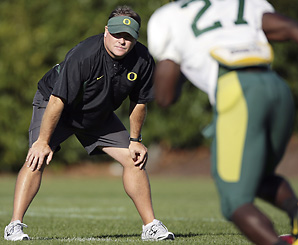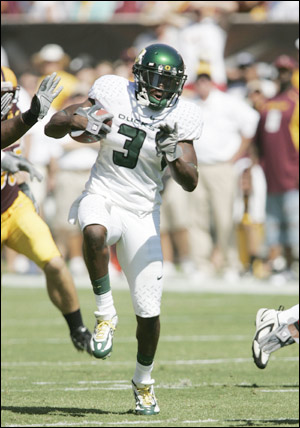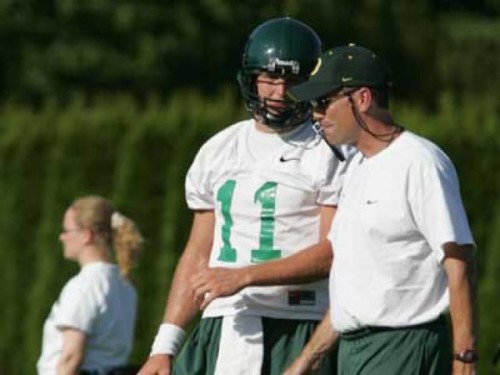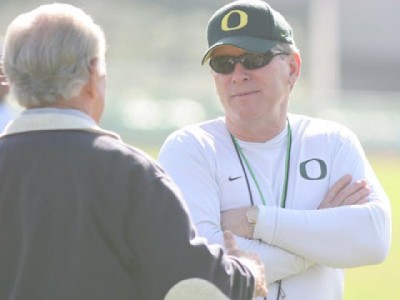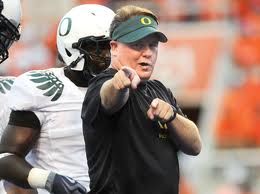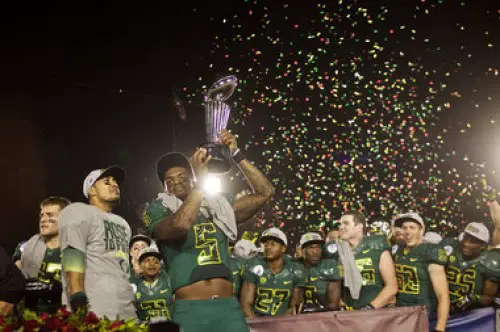The University of Oregon Ducks have experienced a great amount of change in offensive scheme over the past decade. Since 2002 Oregon has had four different offensive coordinators, with drastic changes in both the playbook and philosophy.
Starting with pro-set offensive coordinator Andy Ludwig, to a new spread system implemented by Gary Crowton, and finally to then OC-now Head Coach Chip Kelly’s own brand of spread attack; former Oregon Duck standout wide receiver Cameron Colvin knows what it’s like to catch balls for all three coaches.
“Under coach Kelly, everything was so fresh and genius, that we had complete confidence in our playbook, as it changed everything we did on offense previously.”
-Cameron Colvin, Oregon wide receiver (2004-07)
Colvin played from 2004-2007, learning under all three coaches in very different offensive systems in Head Coach Mike Bellotti’s program. Colvin was very fond of the pro-style attack that actually brought him to Eugene, as he was a fan in high school of Oregon’s play calling, passing game and players.
“I loved how they would line up three-wide in a single back formation and go downfield, consistently with swag and confidence, knowing that something exciting would happen with the Ducks play calling and consistent offense,” said Colvin.
“I mean, we were loaded, when I got there, we had Dante Rosario, we had Dennis Dixon, Ed Dickson, Brian Paysinger, who was having a hot start until he injured his knee against Fresno and spent his senior year on the sideline, it was too bad. He was on pace to be an all-league receiver in ’07, it was tough, we had talent everywhere. We had Stew, JJ, and Andre Crenshaw, and our defense was full of studs. We always seemed to be successful and innovative, airing it out more than most other schools at the time with Ludwig, and part of Crowton’s tenure at Oregon,” Colvin recalls.
Colvin, and the Ducks went from a pro-style attack (Ludwig, 2002-04), which the players at the time loved, to an open spread (Crowton, 2005-06),that the players were not fit for, and making a complete adjustment.
The good news was that Oregon executed at all positions, and got started recruiting different athletes more akin to a spread attack. In 2005 Oregon finished 10-2, being shut out of the BCS, but still turning heads. The switch to the spread and the subsequent offensive explosion helped Oregon get ahead of other schools in the conference in recruiting due to on-field success matched with top-quality facilities and coaches.
After Crowton was “asked to seek employment elsewhere” following the 2006 season, culminating in an embarrassing effort in the 2006 Las Vegas Bowl (Crowton took the offensive coordinator position at LSU), Oregon in 2007 transitioned to new offensive coordinator Chip Kelly, an unknown from UNH who had led record-setting squads at the FCS level. Coach Kelly implemented a very unique, high-tempo motion spread offense that Oregon continues to operate today, setting numerous records in the process.
No play personified Kelly’s flashy spread system then the fake statue of liberty executed week 2 of 2007 vs. Michigan. This play announced to the country that Oregon was now on a whole different level with Coach Kelly calling the plays.
“The biggest difference between the systems run by the two coordinators was in the speed and execution, plus a whole new mind set. Kelly rotates the Ducks deep roster, so most of the standout players will get touches and playing time, but so will the backups.” said Colvin when talking about the transition from Crowton to Kelly. “The playbook is so much more thick, playing for ‘the genius.'”
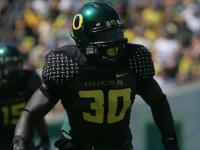
Oregon LB Kwame Agyeman noticed the difference when Chip Kelly entered the program, having to practice against it every day
Oregon LB Kwame Agyeman (2004-07) remembers well the differences between Ludwig, Crowton, and Kelly when practicing against the Oregon offense. “The athletes were not utilized under Crowton and Ludwig like they were under coach Kelly. In practice and in games, we were always moving, we always had a job to do, because the offense would be changing formations with no huddle, then getting back to the line of scrimmage as fast as possible to run the next play, it was really tough to defend.”
“When I was watching the ducks play under coach Bellotti and coach Ludwig in high school, I remember them always airing it out, and running pro sets, which appealed to me, because a lot of focus in that system was on the starting receivers. I would notice guys like Samie (Parker) were catching more than 50 balls a year!” said Colvin. “I wanted that. Under Crowton, I’m not bashing him or saying anything bad, but I would be catching 20-30 balls a year, which really made me have mixed emotions on the field. Under coach Kelly, everything was so fresh and genius that we had complete confidence in our playbook, as it changed everything we did on offense previously. For example, I caught that amount of my first three years in 3-4 games with Coach Kelly, I would be lucky to get the ball playing for Crowton.”
“He (Crowton) ran a predictable offense, which helped us defensively, as we caught on to his scheme fast,” Agyeman recalls. “That was something that really stood out when coach Kelly arrived, it was all business, and if you had talent and speed, he would find a way to get you the ball in big situations. We really grew when our defense started preparing against the athletes and execution we faced in practice. At the time, we had the d-boys, and they shut everything down.”
“When coach Kelly came in, woo, we all knew for real, what our job was and we had to know our role and dissect the playbooks.”
-Kwame Agyeman, Oregon Linebacker (2004-07)
“Dennis (Dixon), Brady Leaf, everyone challenging the secondary. Kelly does an excellent job of preparing a team to win. He made that very clear in practice,” Colvin commented on his third and final offensive coordinator at Oregon.
Colvin was unsure of where exactly he would be heading to school, a 5-star blue chip recruit out of De La Salle High School recruited by every top name in college in 2004. He verbally committed to Michigan and USC, but when time came to fax in the solid commitment, Colvin was a Duck, announcing his decision on ESPN, to the shock of Michigan Wolverine coaches who called him while still on the air to ask why he wasn’t coming to Ann Arbor. His expectation was to be playing in the familiar Oregon pro set offense, to be thrown the ball early and often in Ludwig’s offense, but within a year Ludwig would be gone and the pro set scrapped for a new experimental spread scheme.
“I already had seven or eight friends who were going to school in Eugene, I knew Demetrius (Williams) was doing great, learning the system, and I knew we would be stacked if I signed. We had Brian Paysinger, Garren Strong, Marcus Maxwell, Demetrius Williams, Willie Glasper, Kwame Agyeman, James Finley, and Jaison Williams particularly was brought in with me together. I never got to see Autzen on a recruiting visit, but I heard it was legit after Terrence (Kelly) came home and told me how great it was, and in the end, they just had the most family-oriented environment and comfortable place for me to be going to college. I wasn’t actually sure where I was going, but coach Pellum (Don), coach Neal (John) and Coach Bellotti all came to my house to visit on recruiting trips and made me feel at home. We were so talented and deep already, and what sealed the deal was that running back Terrell Jackson called me on the eve of National Signing Day, and was saying, ‘come on bro, you got to come up here, see what we got going on up here, we’re loaded!‘ Terrell Jackson was the best back in Los Angeles, and he got weeded out on the Ducks depth chart, cause we were so loaded with talent. It was even better that a big number of my teammates came from California, and I had played with or against them growing up through High School.”
Jackson later transferred to UTEP due to lack of carries and playing time in Eugene following the 2005 season.
The difference and transition, going from Ludwig to Crowton was difficult at times for the offense. Most of the personnel on the field were recruited to play in Ludwig’s pro-style offense. Some players like Brady Leaf and H-back/tight end Malachi Lewis, more suited for the drop back pro-set approach, would have likely never be recruited to participate in a spread scheme, and had difficulty adjusting as the offense continued to transition and evolve to a more run-friendly spread attack.
Andy Ludwig’s Last Gasp of the Pro Set Era (2002 – 2004)
The Ludwig era (2002-2004) had ended on a whimper, an injury-plagued 2004 season ended with a disappointing 5-6 finish, with a home loss to Indiana, a very rare occurrence in Eugene. This was the first time that Oregon did not qualify for a bowl game since 1996. The offensive system, for so long the trademark at Oregon, had become predictable and stale, in part due to the vast amount of Bellotti disciples now coaching at other Pac-10 programs.
The heat was on from angry fans and boosters wanting a change, both in coaches and scheme. Bellotti’s adjustment was drastic, scrapping the pro set offense that he had always run at Oregon, going back to when he first joined the Ducks as offensive coordinator in 1989. With the departure of the pro set, so too was it decided that Andy Ludwig’s services were no longer needed.
Gary Crowton’s Experimental Spread (2005 – 2006)
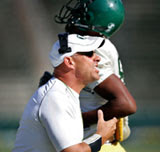
Oregon offensive coordinator Gary Crowton (2005-06) had to learn on the job same as his players how the spread offense worked
For 2005, the Ducks would have an all new look, both in uniform and style of play, switching to a spread offense. Offensive Coordinator Gary Crowton was brought in to lead the new scheme, but he had never utilized a spread offense at any of his previous stops, making it a new learning experience for both Bellotti and Crowton, much less their players. The two traveled the country in the offseason, meeting with spread offense gurus across the nation to learn how it all worked, among them Chip Kelly at UNH.
Under Crowton, the team didn’t feel worse or ill-suited for the new scheme though, despite the steep learning curve. In fact it proved quite successful, setting new offensive records and leading Oregon to a 10-2 season, but deep down individually the team knew they didn’t have their guy.
“Practicing against Ludwig and Crowton’s system, I caught on quick and learned with help from Jerome Boyd and some other teammates,” said Kwame Agyeman.
To the offense, it seemed like Crowton, at times, was a substitute teacher on the field. He had the respect of his players but not the confidence and killer instinct.
Chip Kelly’s High-Speed Attack Sets College Football Ablaze (2007 – Present)
“We just knew we were one step, maybe a year or two away from being a special, special program. Especially when coach Kelly came in, woo, we all knew for real, what our job was and we had to know our role and dissect the playbooks,” Agyeman remembers.
It left many wondering what Oregon was thinking, encouraging established offensive coordinator Gary Crowton to leave (taking the offensive coordinator position at LSU) following the dreadful performance in the 2006 Las Vegas Bowl, and contacting an unknown offensive coordinator at FCS school UNH (University of New Hampshire). That call of fate from Mike Bellotti and the University of Oregon to Chip Kelly, a fairly unheard of genius offensive coach whose teams had set numerous records, to the same job title at the University of Oregon. Kelly accepted, and took his position in history at the University of Oregon.
“he was hard-nosed, straight forward, and knew X’s and O’s like nobody’s business, but at the same time he was definitely a players coach who got us all to be as one, a family.”
-Cameron Colvin (speaking of Oregon coach Chip Kelly)
“Coach Kelly really is a genius, it’s not a cliche,” Agyeman commented.
“His practices were a lot more intense and structured than the previous coordinators. Crowton and Ludwig, it was like, whatever, do what you do, and do it well. With Coach Kelly, it was the opposite, he saw this team with a ton of talent, and helped turn us into ballers, no joke,” Colvin later said about the systems. “With the schemes, it was a lot of X’s and O’s with Ludwig and Crowton, but it worked. We didn’t complain at the time, we just knew we were a few steps away from being a national title contender. We were so deep man, we had 4th, 5th stringers who could be playing anywhere in the country, and that made practices competitive and fun.”
Nobody knew at the time, but the hiring of Kelly in 2007 would change Oregon football forever. Only two years later, long-tenured Head Coach Mike Bellotti would step aside, or upward to the Athletic Director position, making Kelly his successor. By this point the once-unknown Kelly was now a rising-superstar in the coaching ranks, and there was concern that if Oregon didn’t elevate him to head coach now that other schools would offer him a head coaching position stealing Kelly away, and putting the Ducks back at square one trying to maintain their offensive success.
While the cupboard Kelly inherited to start the 2009 season was far from bare, in the time since becoming head coach Kelly has recruited better than at any point in the Bellotti regime, and has had more immediate success than any previous coach in Oregon football history.
According to Agyeman and Colvin; the culture, confidence, and talent level completely changed with the arrival of Chip Kelly.
“On the very first day, coach Kelly called me in his office,” Cameron Colvin recalls. “I was thinking, damn, what did I do now? But instead of it being like that, he was straight up with me. He said ‘Cameron, I know you have had some issues and problems in the past, but I want you to know you’re my guy, and I expect you to be a huge part of this team and this offense.’ I appreciated that about him, he was hard-nosed, straight forward, and knew X’s and O’s like nobody’s business, but at the same time he was definitely a players coach who got us all to be as one, a family.”
Kelly and his staff have been bringing in record-setting recruiting classes year after year, getting commitments from high-caliber players that the program wouldn’t of had a chance of getting ten years ago. Since “The Genius” joined the Ducks in 2007, competition has never been more fierce on the practice field.
“Kelly is the type of coach who will not keep playmakers on the sideline or out of the playbook, he finds a way to get every ounce of athletic talent on the field, it’s difficult to get to them in one-on-one situations as they get into space. Successfully, Kelly somehow finds ways to get all playmakers their touches to impact each and every game,” Agyeman said when asked about going up against the new scheme in practice. “That is what separates Kelly from Mike Bellotti, Kelly is a hard-nosed coach who takes no indiscretions, and expects to win every game played. Bellotti looked happy if the team won or lost, he always had the same expression. He wasn’t a players coach like Kelly is. Bellotti was conservative to a fault, chip runs three plays in 10 seconds. Great hire Ducks!”
“Once coach Kelly arrived, it was all a cutthroat business, the expectation level rose and keeps growing,” remembers Colvin of his glory days on the college gridiron. “Practices were crazy, going up against Kwame, Nick Reed, JD Nelson, Jerome Boyd, the d-boyz-TJ Ward, Walter Thurmond III, Jairus Byrd and Patrick Chung every day was no joke. No matter what our record was, those teams were loaded and we had a lot of ballers, lots of great players all over the field.”
Cameron Colvin really came into his own for the Ducks in 2007 in Chip Kelly’s new spread offense
In his three seasons as “The Man,” Kelly has gone 34-6 overall, 25-2 in the PAC-12,with only one loss at home (last season to USC), adding three consecutive conference championships to his golden resume. Twice he has been award national coach of the year honors, something Bellotti never attained in his 14 years at the helm. In three seasons, Kelly has led the Ducks to three consecutive BCS games, the only team in the country to do so. During this same stretch, Oregon is also the only team in the nation at the FBS level that has not changed a single assistant coach…coincidence?
He is a players coach, who has the ultimate respect of his players who would suit up in a flame pit if he asked them to, and that’s more important to young, impressionable men than flashy uniforms or nice locker rooms with Xbox 360’s built into each stall.
For all the flash and glitz provided by Oregon’s top-notch facilities and revolutionary branding efforts, at the end of the day it is the people behind the program, the coaches and support staff, that push the program to heights never before seen in Eugene. At the heart of that success, the centerpiece of it all, is Coach Chip Kelly and the philosophies implemented under his tutelage. It took some time, but eventually Oregon got it right–third time’s the charm.
Today Cameron Colvin not only continues to catch passes, but through mixologysport.com provides an Oregon Ducks-centric line of sports watches.  Mixology Sport Will now be an Official Watch in the OREGON BOOK STORES and DUCK SHOPS, with Special Oregon Duck Designs!
Mixology Sport Will now be an Official Watch in the OREGON BOOK STORES and DUCK SHOPS, with Special Oregon Duck Designs!
Related Articles:
Chip Kelly Update: Everything's Good Again ...
Chip Kelly Update: Wailing and Gnashing of Teeth
Shock and Awe -- The Oregon Ducks' Football Hangover Effect
Despite Lopsided Score, Georgia State "Never Stopped Believing"
Hope Springs Eternal for Ducks
Incompetent Pac-12 Officials: How Do You Miss ALL of THIS?
These are articles where the writer left and for some reason did not want his/her name on it any longer or went sideways of our rules–so we assigned it to “staff.” We are grateful to all the writers who contributed to the site through these articles.

